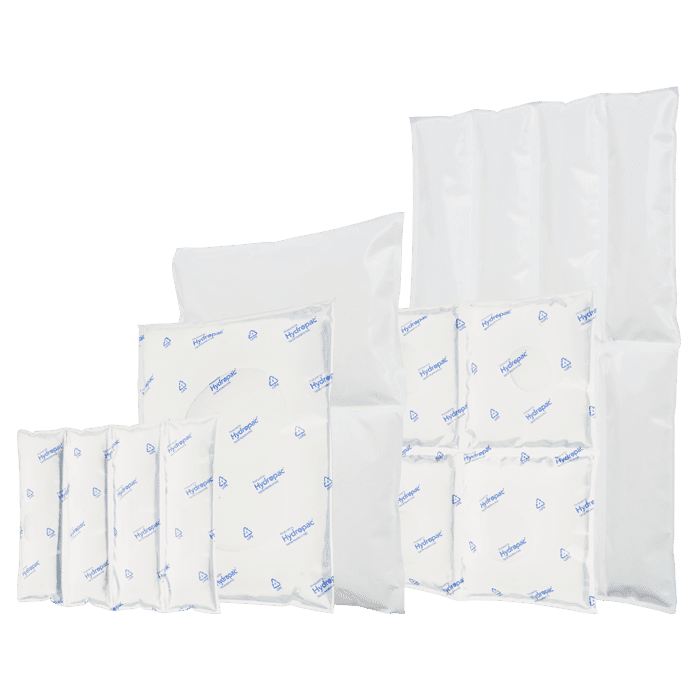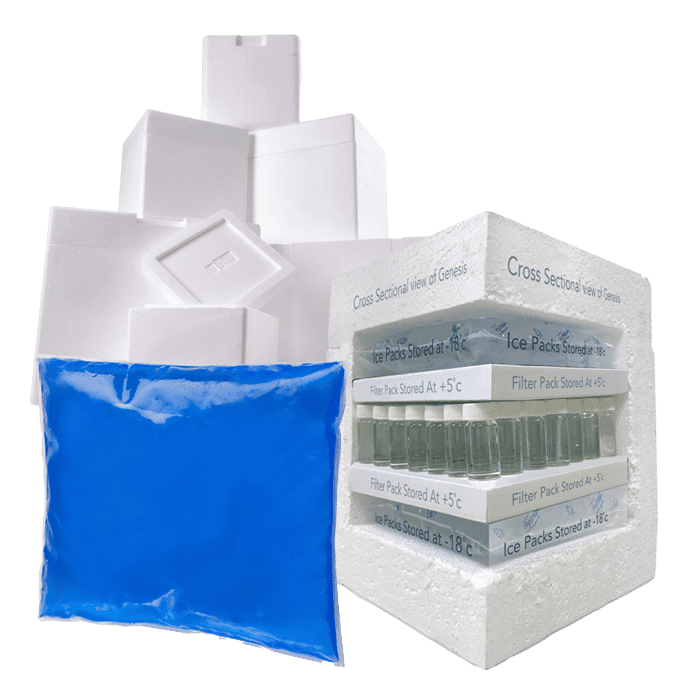Ice Packs: The Unsung Heroes of Temperature Control in the Food Industry
The integrity and safety of products from farm to table hinge significantly on maintaining the correct temperature. While it’s widely recognised that perishable goods need to be kept cool, the reality is that nearly all food products, including those we might not immediately consider, benefit from precise temperature control. Ice packs emerge as a simple, yet remarkably effective solution to this universal challenge, proving to be the unsung heroes of food safety and quality preservation.
Temperature Control
Often, we limit our thoughts of temperature-sensitive foods to the obvious candidates: dairy, meat, fruits, and vegetables. However, the range of temperature sensitivity is much broader. Items like condiments, which we casually store in our pantry, snacks that sit out during a party, and canned goods stacked on shelves are all vulnerable to the adverse effects of improper temperature control. High heat can turn a perfectly good chocolate bar into an unappealing mess, spoil your favorite sauces, and even accelerate the deterioration of canned products. This underscores a critical truth: comprehensive temperature control is essential across the board in the supply chain.
Custom chilled solutions for you
Hydropac offers every customer a customized solution for chilled and conditioned shipping. For example, we help a customer with limited freezing capacity to deliver gel packs frozen and ready to use, and we can manufacture almost all shapes and sizes of cooling elements. As a customer, you come first: we are here to help you.
The Critical Role of Ice Packs in the Cold Chain
The concept of the cold chain—a temperature-controlled supply chain—is crucial for preserving food quality and safety from the moment of production until it reaches the consumer. Here, ice packs play an important role. By providing a reliable and controllable source of cooling, ice packs help maintain the necessary low temperatures to prevent the growth of harmful bacteria, ensuring that food retains its flavor, texture, and nutritional value during transit.
Why Ice Packs Are a Go-To Solution
- Flexibility: Ice packs can be adapted to suit a wide range of food products, offering tailored cooling solutions that cater to specific temperature requirements.
- Efficacy: They are highly effective in maintaining desired temperature ranges, critical for products that need to stay within specific temperature thresholds to preserve freshness and prevent spoilage.
- Eco-Friendly: Many ice packs, particularly those filled with water, are reusable and environmentally friendly, aligning with the industry’s growing commitment to sustainability.
Busting Myths and Addressing Challenges
There’s a common misconception that only select food items require refrigeration or that natural weather conditions can adequately substitute for controlled cooling. Ice packs challenge this notion by providing a consistent cooling effect, ensuring food products remain safe and high-quality, irrespective of external temperature fluctuations.
A Shared Responsibility for Food Safety
Educating stakeholders in the food industry about the importance of temperature control is crucial. Mishandling can lead to increased waste, safety risks, and potential health hazards. Ice packs represent an easy-to-implement part of the solution, emphasising everyone’s role—from producers to consumers—in maintaining proper temperature conditions.
Using Ice Packs Wisely
Not all situations call for a ‘more is better’ approach when it comes to ice packs. It’s about finding the right balance to ensure products are kept at their optimal temperatures without unnecessary waste. Whether for chilled or frozen goods, determining the precise quantity of ice packs needed based on shippinhyg requirements is crucial for effective temperature management.
Year-Round Reliability
Temperature control challenges don’t pause for the winter months. External temperatures are only one piece of the puzzle, and seasonality requires constant vigilance to ensure food products are kept within safe temperature ranges. Ice packs provide a reliable solution that works consistently, regardless of the season, ensuring the quality and safety of food products throughout the year.
Hydropac’s Commitment to Effective Cooling Solutions
Leading with innovation, Hydropac has championed the use of water-based ice packs, recognising their superior cooling performance and alignment with sustainable practices. These ice packs are not just effective; they are a testament to Hydropac’s dedication to providing environmentally responsible and highly functional solutions tailored to the needs of the food industry.
Precise Ice Pack Quantity – A Calculated Approach
One of the most prevalent missteps in temperature control is the misconception that adding more ice packs is always better. However, excessive cooling can compromise the quality of certain products.
Here, Hydropac offers a practical solution—a guide that facilitates the selection of the right quantity of ice packs based on your specific shipping requirements. This ensures you don’t use more ice packs than necessary, balancing economic considerations and environmental responsibility.
Guidelines for using ice packs in transit
Chilled Goods
30% ice of shipped goods
- 4-6 Kg Boxes require 2 – 4 x 500g Ice Sheets
- 6-10Kg Boxes require 4 – 6 x 500g Ice Sheets
- 10-15Kg Boxes require 6 x 500g Ice Sheets
- 20-25Kg Boxes require 6 – 8 x 500g Ice Sheets
Frozen Goods
50% ice of shipped goods
- 4-6 Kg Boxes require 4 – 6 x 500g Ice Sheets
- 6-10Kg Boxes require 6 – 10 x 500g Ice Sheets
- 10-15Kg Boxes require 10 – 15 x 500g Ice Sheets
- 20-25Kg Boxes require 10 – 14 x 500g Ice Sheets
Ensuring the Purity of Water in Ice Packs: Hydropac’s Rigorous Process
When it comes to the water used in ice packs, not just any water will do. Hydropac is committed to using water of the highest quality for its ice packs, ensuring every product is both safe and effective. This commitment to quality involves a detailed treatment process, transforming ordinary water into the pure, filtered essence that fills each ice pack.
The Journey to Purity
Hydropac’s water undergoes a meticulous multi-stage process before it finds its way into their ice packs:
- Filtration: The journey begins with a three-stage filtration process designed to remove any particulate matter and large impurities. This is the critical first step in ensuring that the water is clear of any visible contaminants.
- Purification: Next, the water is subjected to purification techniques like distillation or reverse osmosis. These processes are key to eliminating dissolved contaminants and minerals, ensuring the water is pure and suitable for use in ice packs.
- Sterilisation: The final guard against impurities involves sterilization. Using UV treatment or ozonation, the water is thoroughly cleansed of any harmful microorganisms, making it completely safe for contact with food and medical supplies.
This comprehensive approach to water treatment guarantees that the water in Hydropac’s ice packs is pristine, ensuring the safety and integrity of the food products they are designed to protect.
Sustainability in Disposal and Packaging
Hydropac’s water ice packs aren’t just about exceptional purity; they’re also a testament to the company’s dedication to sustainability. Recognizing the importance of eco-friendly practices, Hydropac ensures that the water from their ice packs can be safely disposed of down the drain, integrating seamlessly with household water without causing harm. Alternatively, this pure water can be reused to water plants or assist in animal care, offering an additional layer of environmental consideration.
The commitment extends to the packaging of the ice packs as well. The outer film of the ice packs is designed for easy recycling at specialised LDPE recycling facilities, supporting the company’s environmental responsibility goals. For those unsure where to recycle these materials, local councils and some supermarkets provide recycling points for plastic bags, where the ice pack films can also be deposited.
A Symbol of Hydropac’s Environmental and Safety Standards
Hydropac’s water ice packs embody the company’s high standards for safety, efficacy, and environmental stewardship. Each pack leaving the manufacturing facility carries a certification of its cleanliness and safety, underscoring Hydropac’s confidence in their product. In every step, from the rigorous purification of water to the thoughtful consideration of disposal and recycling options, Hydropac demonstrates a deep respect for both the planet and the customers they serve. Through these practices, Hydropac not only delivers products that are effective in temperature control but also champions a healthier and more sustainable world.
The critical role of ice packs in the food industry cannot be overstated. As versatile, efficient, and environmentally friendly solutions, they play an integral role in maintaining the cold chain, ensuring that food products arrive at their destination safely and deliciously. Ice packs are indeed the unsung heroes of the food industry, making them an indispensable tool in the ongoing effort to preserve food safety, quality, and sustainability.
Sustainability Hydropac and CSR
Sustainability isn’t just a trend for us – it’s a promise. As we innovate, create, and lead, we keep our planet’s well-being at the forefront. With Hydropac, you’re not just preserving the quality of your cargo; you’re contributing to a healthier world.
Experience the power of sustainable temperature assurance with Hydropac – where excellence and environmental responsibility coexist for a brighter future.





